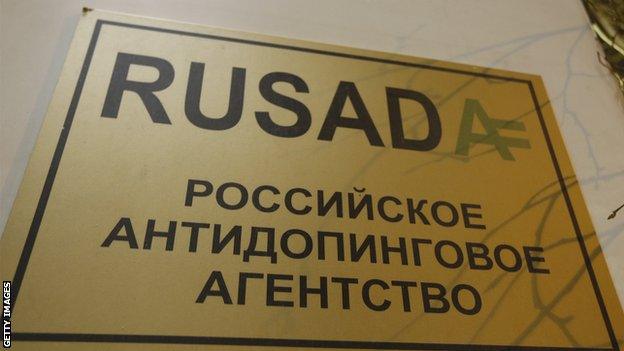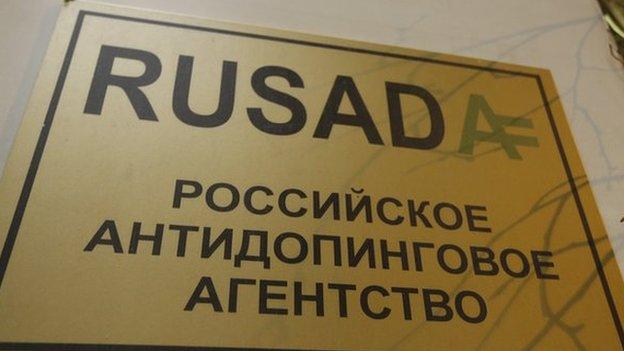Wada identifies 'target pool' of 298 athletes from Russian laboratory samples
- Published

Leading athletes have opposed the lifting of Russia's suspension
The World Anti-Doping Agency has identified a "target pool" of almost 300 athletes with the "most suspicious" samples taken from the Russian Anti-Doping Agency's laboratory in Moscow.
Wada took data from 2,262 samples from the Rusada laboratory in January.
Of those, 578 samples - taken from 298 athletes - were made a priority for investigation.
Wada has now sent evidence about 43 of those athletes to their respective international federations.
And it says those federations have "commenced assessment with a view to identifying those cases to take forward as anti-doping rule violations".
Wada's visit was a condition of Russia's reinstatement in September 2018, ending a three-year suspension following a scandal over state-sponsored doping
How the Russian doping scandal unfolded
December 2014: As many as 99% of Russian athletes are guilty of doping, a German TV documentary alleges.
November 2015: A Wada commission publishes an independent report alleging widespread corruption, amounting to state-sponsored doping in Russian track-and-field athletics. Rusada is declared non-compliant.
May 2016: Former Moscow anti-doping laboratory boss Grigory Rodchenkov,, external who has turned whistleblower, says dozens of Russian athletes at the 2014 Winter Olympics in Sochi had cheated.
July 2016: Russia operated a state-sponsored doping programme for four years across the "vast majority" of summer and winter Olympic sports, says a report by Professor Richard McLaren.
August 2016: The International Olympic Committee (IOC) decides against imposing a blanket ban on Russian athletes at the 2016 Olympics in Rio. Individual sporting federations rule instead, with 271 Russians competing.
December 2016: Wada publishes the second part of the McLaren report, which says more than 1,000 Russian athletes benefited from doping.
January 2017: Rusada and Russian sport authorities are given a list of criteria, external to meet before winning back recognition.
March 2017: Wada says Russia's anti-doping reforms are not happening quickly enough.
February 2018: Russia are banned from competing at the 2018 Winter Olympics in South Korea by the IOC, but 169 athletes who prove they are clean are allowed to compete under a neutral flag.
May 2018: Wada writes to Rusada offering a 'compromise' solution.
September 2018: News of the compromise, revealed by the BBC, prompts fury from athletes and doping bodies.
December 2018: Wada team is unable to access Moscow laboratory and data.
January 2019: Wada team gains access to Moscow laboratory and data.
April 2019. Wada collects 2,262 samples from the laboratory, split into A and B samples and contained within 4,524 collection bottles.
- Published30 April 2019
